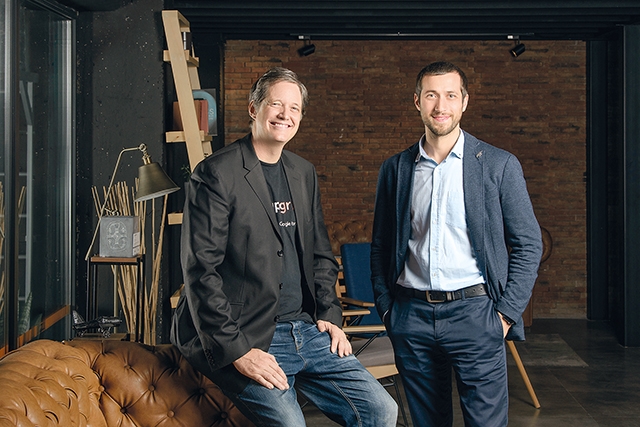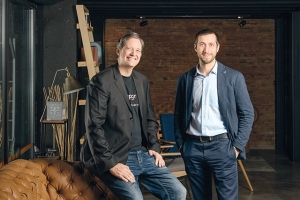American within Georgian Startup Ecosystem Evangelists
Interview
When Colin Donohue moved to Georgia, he had never been before. His wife had told him stories of the 1990s and he was ready for anything. What he found delighted him.
“I’ve never been to a country with a GDP that’s this safe,” he tells us. “As a foreigner working with US clients, there’s an amazing amount of freedom. Things are way less expensive than in the US but it’s more interesting and cooler. You see new projects happening all the time. Just in my few years here new things have popped up, like Fabrika and Tech Park, 8000 Vintages and Wine Factory. In the US my city looks the same from year to year. Tbilisi is bursting with life and new things. And it’s so much more affordable that I have freedom to volunteer a lot and try and create my own things to add to this.”
When Donohue was first here, he planned to spend two years as a requirement of his wife’s Muskie fellowship, then return to the US. As someone who believes in being a positive force in the world, he wanted to leave a gift to Georgia, so that when he left something would be improved by his contribution.
“I began a Startup Grind chapter, as I saw governmental projects but to me the center of the startup ecosystem is startup founders,” Donohue says. “It’s not government or donors that should drive the ecosystem, it’s the people who are doing the hard work of growing companies from zero.”
He talked to as many people as he could involve with startups and gained their insights about Georgia and the limitations and potential.
“I’m a reasonably clever person, but I know that to create real impact you need to listen and learn. Ideas and strategies should come from people who know the place and issues most deeply. If I do anything well, it’s finding good people and learning from them.”
Initiating the first ever Georgian Startup Ecosystem gathering
The turning point Donohue felt was the Startup Ecosystem Retreat, a two-day retreat with 30 of the top people in the startup ecosystem. He organized the event as a volunteer and Crystal Fund covered expenses for participants. The majority of the people were top startup founders, with a number of other ecosystem players.
“What came out of the retreat was a remarkable consensus about where the ecosystem was and where it needed to go. It inspired me to move more in the direction of helping promising startups move toward becoming success stories to inspire others,” Donohue tells us.
Helping the creation of the Georgian Unicorn
Perhaps the biggest success has been the case of Pulsar AI. “I was researching where Georgians had been successful in technology startups and found George Arison (Irakli Areshidze). I got one of his investors to introduce us and he agreed to come to a dinner we organized with startups we brought to Startup Grind Global.” Giorgi Tukhashvili recruited Pulsar AI to be part of the eight-person delegation from Georgia which went to Silicon Valley.
Gio and Colin, the “dynamic duo” introduced Pulsar and Arison and this began a chain of events which may result in the first Georgian startup success story.
“You have a dream team of Pulsar, who is super sharp and has a track record, and George who has raised over $300 Million, knows a ton of top VCs, and has deep connections in the automotive vertical,” Donohue says. “We are proud to have introduced them, and now Pulsar has raised a half million dollars and their CEO has moved to San Francisco to work directly on growing the company. Development jobs are staying in Georgia, and they are poised to grow something of great value.”
He then comments on the power of being a volunteer. “It would have taken a bunch of money to pay for the time Gio and I put into that trip. But because we didn’t depend on any donors or corporates we just went and did it. Literally nobody would contribute any funding, including companies using “startup” in their marketing campaigns. GITA pitched in for the startups to go but we had to fund our own time and travel of our pockets.”
This summer, George Arison joined Pulsar’s board as Chairman and they raised initial seed funding from US and Georgian investors. Whether Pulsar grows to be a unicorn or not, it is a good example for the Georgian startup ecosystem.
Filling gaps in the Georgian Startup Ecosystem
Donohue had been doing angel investor trainings to help investors in Georgia understand startup investing. The approach and thinking of angel investing is different than the typical construction projects so common for Georgian investors.
“I was involved in a project with a very wealthy Group in Georgia. They said they wanted to do startup investing but were doing it all wrong. The expectations were incorrect. They were asking if they invested, how many eggs they would get per month. I was trying to explain that it was a beef steer and it would not produce eggs, but in the end when it went to market everyone would eat well. It’s the difference between revenue (local model) and asset-growth velocity. If you’re getting revenue from a startup, it’s either not a startup or you’re doing it wrong. If it’s a true startup opportunity (high-growth, scalable, etc.) you should be reinvesting everything in growth. SMEs are fine, but they are not startups”.
“I was pleased to be involved in a demonstration project for angel investors,” Donohue says. “We had several people putting in modest amounts of money. Often Georgian investors want to be the sole investor, and take a large amount of shares. This often dooms startups to future failure. The goal of angel investors should be to find good companies and get a modest share of something that can grow very big.”
“It’s best practice to put smaller investments in more companies rather than too much in one company. The math just doesn’t work if you bet too heavily on just a couple companies”
Donohue feels Georgia has come a long way on the startup side, and some progress has been made on the investor side. “During my first year or two, I was more about ‘Angle Investing Prevention.’ Angels invest in a manner that helps founders succeed. I coined the term “angle” investors to describe folks who are “working an angle,” trying to gain power and leverage over founders rather than supporting.
When asked how long he expected to stay in Georgia, he said wasn’t sure. “At this point, Georgia feels like home to me. But I have elderly parents in the US and need to get back to take care of them at some point. When I do go, I’m sure I’ll be back, or keep helping folks when they come to the US maybe!”
“It’s a super interesting time here, and I’ve made some really amazing people I want to help succeed. Having moved away from my US consulting business, I need to figure out how to make a living here, but I hope it will include supporting startups.”
Helping to position Georgia on the global map of startups
Donohue and his team have taken on an ambitious project which they feel will be a big benefit for Georgia, hosting an international Startup Grind conference in Tbilisi which will draw international startups, investors, and others from a region of over 20 countries from Eastern Europe through Central Asia.
Startup Grind Europe-Asia Connect plans to be the biggest Startup Grind conference in the world after Silicon Valley and London.
“Frankly I don’t like big events. I’d rather have 30 good folks in a room learning from each other than 3000 sitting in rows in a theater. But this event we’re doing to position Georgia globally ‘on the map’ of startup activity,” Donohue says. “I truly believe Georgia can become a destination for startups who want a cool inexpensive place to grow their company. Silicon Valley was amazing, but the tools the tech community created have allowed people to found companies anywhere in the world. Why would you live in San Francisco, where $200,000/year is not enough to support a family, when you can live a great life in Tbilisi for a small fraction of that.”
Donohue is hoping Georgia will really rally around and seize the opportunity to use the conference as a vehicle for publicizing Georgia and helping attract talented people and investors from around the world.
“The most important thing to see in my story is I’m just someone who wanted to make good things happen and I was willing to just do it, not wait for some donor or government or corporation. Startup Grind itself was a startup. We bootstrapped it with our own time and money. You can’t wait for someone else. Just start something, and see what happens.”
“For me, my life has been enriched by the amazing people I’ve gotten to work with. I work with better people here than I could have imagined in the US. Gio Tukhasvhili, my co-director in Startup Grind and cofounder of Winefinder, and I have a running joke. We kept doing small things which turn into bigger and bigger opportunities and impact. We kept finding ourselves saying “well, that escalated quickly”.
Not everything will work how you hope and there will be challenges. But I think our experience shows that if you start doing something important, you attract great people.”
By Colin Donohue











